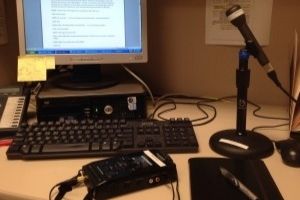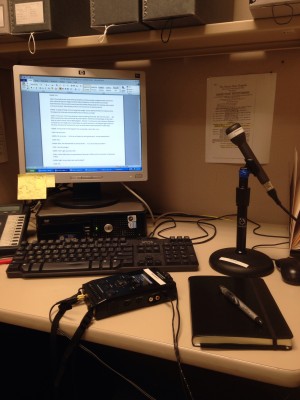Pause for Thought

A blog post by Exhibitions Intern Elizabeth Livesey. To read more posts by interns click HERE.
“You see what she did there? That’s good. That’s really good. You hear that? She paused. That silence makes people feel like they need to say more—like they need to fill the space. You can get some great stuff that way.”
Karen Falk, our curator at the museum, is sharing with me some tricks of the trade before I conduct an informal oral history over the phone the following day.
And these are tricks that I could definitely use—I’ve sometimes been known to exhibit signs of mild tremors when asked to even ring up distant relatives. While the idea of speaking with a stranger about their career choices and personal values is then definitely a little intimidating at first, it’s actually not so much the conversation that puts me on edge, but rather something about the nature of speaking over the phone. It’s precisely that pause that Karen keeps talking about—the lingering silence that makes my palms sweat as imagine the other person’s expression on the receiving end.

We’re conducting these interviews as part of our research for the museum’s upcoming exhibit, Beyond Chicken Soup: Jews and Medicine in America (set to open in March of 2016). A common occurrence at the museum as many of the exhibits maintain a unique first person perspective, I’ve already read through five oral history transcriptions conducted with medical professionals (or their family members) who worked in and around Baltimore during the 50s. We’ll eventually use these interviews either as brief quotes in the soundscape of the exhibit, or in their more complete form and create a listening station for visitors to enjoy on their own.
However they ultimately become incorporated into the exhibit, this unique opportunity to explore these stories was one of things I looked forward to most when I began this internship a month ago and has truly been an incredibly fascinating, and at times, even humbling experience. One interviewee spoke about Jewish quotas in nursing schools when her sister applied in the early 1950s and the blatant antisemitism she was confronted with by the administration. Another weaved colorful stories about a family business fabricating anatomically correct plastic models for medical schools. Nearly every oral history transcription I read highlighted a sense of the interconnectedness of medicine and Jewish values—of a shared notion of the tradition of community care and the sanctity of human life.
Reading these personal insights made me all the more excited to organize my own oral history interview, to be conducted with a current nurse practitioner student in New York. With this conversation and a few others, Karen is looking to acquire more contemporary perspectives in the field and I look forward to uncovering the new stories and experiences of someone not much older than myself. But then my early onset Parkinson’s flares up again…
Despite my growing nervousness, the following afternoon I felt confident in the knowledge that I was at least formally prepared. Armed with a few more insider tricks from Karen, a prepared list of some twenty questions, and an intimidating piece of recording equipment, I felt pretty well equipped. And, for the most part, I was. I successfully managed to set up the microphone, I asked the questions we had prepared, and somehow even overcame the impulse to fill the static void that inevitably arose. But what I wasn’t at all expecting was to be so blown away by my interviewee’s perspective and career choices, so much so that the silence that hung in the air wasn’t as piercing as I anticipated it to be. In fact, it wasn’t unsettling at all.
I realized, admittedly only after hanging up, that this phone call in fact allowed me to let her words speak entirely for themselves—liberated from the visual stimuli that can otherwise distract or distort our impressions. The lingering pauses that I am now playing back as I transcribe the interview don’t magnify the unease I felt, but rather the power of her words.
